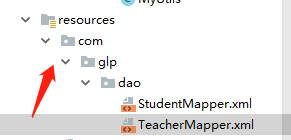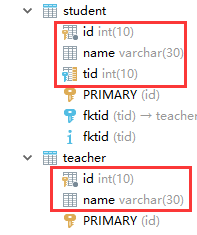resultMap处理复杂映射问题
文章目录
- resultMap复杂映射问题
- Ⅰ 多对一查询:学生——老师
- (1) 创建实体类POJO;
- (2) 创建学生实体类对应的接口;
- (3) 编写学生接口对应的Mapper.xml
- (4)在核心配置类中引入Mapper
- (5) 测试
- Ⅱ 一对多查询:老师——学生
- (1)实体类
- (2) 接口
- (3)接口对应的Mapper.xml
- (4)测试:
resultMap复杂映射问题
association:关联(多对一的情况)
collection: 集合(一对多的情况)
javaType: 用来指定实体类中属性的类型。
ofType: 用来指定映射到List或集合中POJO的类型,泛型的约束类型。
Ⅰ 多对一查询:学生——老师
数据库表:
CREATE TABLE `teacher` (
`id` INT(10) NOT NULL,
`name` VARCHAR(30) DEFAULT NULL,
PRIMARY KEY (`id`)
) ENGINE=INNODB DEFAULT CHARSET=utf8;
INSERT INTO teacher(`id`, `name`) VALUES (1, '王老师');
CREATE TABLE `student` (
`id` INT(10) NOT NULL,
`name` VARCHAR(30) DEFAULT NULL,
`tid` INT(10) DEFAULT NULL,
PRIMARY KEY (`id`),
KEY `fktid` (`tid`),
CONSTRAINT `fktid` FOREIGN KEY (`tid`) REFERENCES `teacher` (`id`)
) ENGINE=INNODB DEFAULT CHARSET=utf8;
INSERT INTO `student` (`id`, `name`, `tid`) VALUES ('1', '小明', '1');
INSERT INTO `student` (`id`, `name`, `tid`) VALUES ('2', '小红', '1');
INSERT INTO `student` (`id`, `name`, `tid`) VALUES ('3', '小张', '1');
INSERT INTO `student` (`id`, `name`, `tid`) VALUES ('4', '小李', '1');
INSERT INTO `student` (`id`, `name`, `tid`) VALUES ('5', '小王', '1');
(1) 创建实体类POJO;
@Data
public class Student {
private int id;
private String name;
private Teacher teacher;
}
@Data
public class Teacher {
private int id;
private String name;
}
(2) 创建学生实体类对应的接口;
public interface StudentMapper {
//查询所有学生的信息
List<Student> getStudent();
List<Student> getStudent2();
}
(3) 编写学生接口对应的Mapper.xml
为了达到和接口在同一个包中的效果,在resource文件夹下新建包结构com.glp.dao:

<?xml version="1.0" encoding="UTF-8" ?>
<!DOCTYPE mapper
PUBLIC "-//mybatis.org//DTD Config 3.0//EN"
"http://mybatis.org/dtd/mybatis-3-mapper.dtd">
<mapper namespace="com.glp.dao.StudentMapper">
<!--按照结果查询——联表查询-->
<select id="getStudent2" resultMap="StudentMap2">
select s.id sid,s.name sname,t.name tname from student s, teacher t where s.tid=t.id;
</select>
<resultMap id="StudentMap2" type="Student">
<result property="id" column="sid"/>
<result property="name" column="sname"/>
<association property="teacher" javaType="Teacher">
<result property="name" column="tname"/>
</association>
</resultMap>
<!--按照查询嵌套处理——子查询-->
<select id="getStudent" resultMap="StudentMap" >
select * from student;
</select>
<resultMap id="StudentMap" type="Student">
<result property="id" column="id"/>
<result property="name" column="name"/>
<!--复杂属性:对象association, 集合collection-->
<association property="teacher" column="tid" javaType="Teacher" select="getTeacher"/>
</resultMap>
<select id="getTeacher" resultType="Teacher">
select * from teacher where id = #{id};
</select>
</mapper>
在多对一查询中,需要用到teacher这个表,每个学生都对应着一个老师。而property只能处理单个属性,像teacher这种复杂属性(内含多个属性)需要进行处理。处理复杂对象要用association 。
方式一:联表查询(直接查出所有信息,再对结果进行处理)
<resultMap id="StudentMap2" type="Student">
<result property="id" column="sid"/>
<result property="name" column="sname"/>
<association property="teacher" javaType="Teacher">
<result property="name" column="tname"/>
</association>
</resultMap>
直接查询出学生和老师,然后用association去取老师里面的属性property。
方式二:子查询(先查出学生信息,再拿着学生中的tid,去查询老师的信息)
<resultMap id="StudentMap" type="Student">
<result property="id" column="id"/>
<result property="name" column="name"/>
<!--复杂属性:对象association-->
<association property="teacher" column="tid" javaType="Teacher" select="getTeacher"/>
</resultMap>
<select id="getTeacher" resultType="Teacher">
select * from teacher where id = #{id};
</select>
在resultMap中引入属性association,通过javaType指定property="teacher"的类型,javaType="Teacher"。通过select引入子查询(嵌套查询)。

这里是拿到学生中的tid,去查找对应的老师。
(4)在核心配置类中引入Mapper
db.properties:数据库连接参数配置文件
driver = com.mysql.jdbc.Driver
url=jdbc:mysql://localhost:3306/mybatis?useSSL=true&useUnicode=true&chracterEncoding=utf8
username =root
password =mysql
mybatis.xml:
<?xml version="1.0" encoding="UTF-8" ?>
<!DOCTYPE configuration
PUBLIC "-//mybatis.org//DTD Config 3.0//EN"
"http://mybatis.org/dtd/mybatis-3-config.dtd">
<configuration>
<properties resource="db.properties">
<property name="username" value="root"/>
<property name="password" value="mysql"/>
</properties>
<settings>
<setting name="logImpl" value="STDOUT_LOGGING"/>
</settings>
<typeAliases>
<typeAlias type="com.glp.POJO.Student" alias="Student"/>
<typeAlias type="com.glp.POJO.Teacher" alias="Teacher"/>
</typeAliases>
<environments default="development">
<environment id="development">
<transactionManager type="JDBC"/>
<dataSource type="POOLED">
<property name="driver" value="${driver}"/>
<property name="url" value="${url}}"/>
<property name="username" value="${username}"/>
<property name="password" value="${password}"/>
</dataSource>
</environment>
</environments>
<mappers>
<mapper class="com.glp.dao.StudentMapper"/>
<mapper class="com.glp.dao.TeacherMapper"/>
</mappers>
</configuration>
注意:
要保证接口和Mapper.xml都在同一个包中。
(5) 测试
public class UserDaoTest {
@Test
public void getStudent(){
SqlSession sqlSession = MyUtils.getSqlSession();
StudentMapper mapper = sqlSession.getMapper(StudentMapper.class);
List<Student> list = mapper.getStudent();
for (Student stu:list ) {
System.out.println(stu);
}
sqlSession.close();
}
@Test
public void getStudent2(){
SqlSession sqlSession = MyUtils.getSqlSession();
StudentMapper mapper = sqlSession.getMapper(StudentMapper.class);
List<Student> list = mapper.getStudent2();
for (Student stu:list ) {
System.out.println(stu);
}
sqlSession.close();
}
}
Ⅱ 一对多查询:老师——学生
(1)实体类
@Data
public class Student {
private int id;
private String name;
private int tid;
}
@Data
public class Teacher {
private int id;
private String name;
private List<Student> students;
}
(2) 接口
package com.glp.dao;
public interface TeacherMapper {
Teacher getTeacher(@Param("tid") int id);
Teacher getTeacher2(@Param("tid") int id);
}
(3)接口对应的Mapper.xml
<?xml version="1.0" encoding="UTF-8" ?>
<!DOCTYPE mapper
PUBLIC "-//mybatis.org//DTD Config 3.0//EN"
"http://mybatis.org/dtd/mybatis-3-mapper.dtd">
<mapper namespace="com.glp.dao.TeacherMapper">
<!--方式一 ======================= -->
<select id="getTeacher" resultMap="TeacherStudent">
select s.id sid, s.name sname, t.name tname, t.id tid from
student s ,teacher t where s.tid = t.id and t.id = #{tid};
</select>
<resultMap id="TeacherStudent" type="Teacher">
<result property="id" column="tid"/>
<result property="name" column="tname"/>
<collection property="students" ofType="Student">
<result property="id" column="sid"/>
<result property="name" column="sname"/>
<result property="tid" column="tid"/>
</collection>
</resultMap>
<!--方式二 ======================= -->
<select id="getTeacher2" resultMap="TeacherStudent2">
select * from teacher where id = #{tid};
<!--这里的tid和接口中指定的属性名相同-->
</select>
<resultMap id="TeacherStudent2" type="Teacher">
<result property="id" column="id"/>
<result property="name" column="name"/>
<!--上面的两个可以省略-->
<collection property="students" column="id" javaType="ArrayList" ofType="Student" select="getStuById"/>
</resultMap>
<select id="getStuById" resultType="Student">
select * from student where tid=#{tid};
<!--查询老师对应的学生,#{tid}-->
</select>
</mapper>
方式一:联表查询,需要写复杂SQL
collection 用来处理集合,ofType用来指定集合中的约束类型
联合查询时,查询出所以结果,然后再解析结果中的属性,将属性property赋予到collection中。
方式二:子查询,需要写复杂映射关系


查询学生时,需要拿着老师的id去查找,column用来给出老师的id。
(4)测试:
package com.glp.dao;
public class UserDaoTest {
@Test
public void getTeacher(){
SqlSession sqlSession = MyUtils.getSqlSession();
TeacherMapper mapper = sqlSession.getMapper(TeacherMapper.class);
Teacher teacher = mapper.getTeacher(1);
System.out.println(teacher);
sqlSession.close();
}
@Test
public void getTeacher2(){
SqlSession sqlSession = MyUtils.getSqlSession();
TeacherMapper mapper = sqlSession.getMapper(TeacherMapper.class);
Teacher teacher = mapper.getTeacher2(1);
System.out.println(teacher);
sqlSession.close();
}
}


